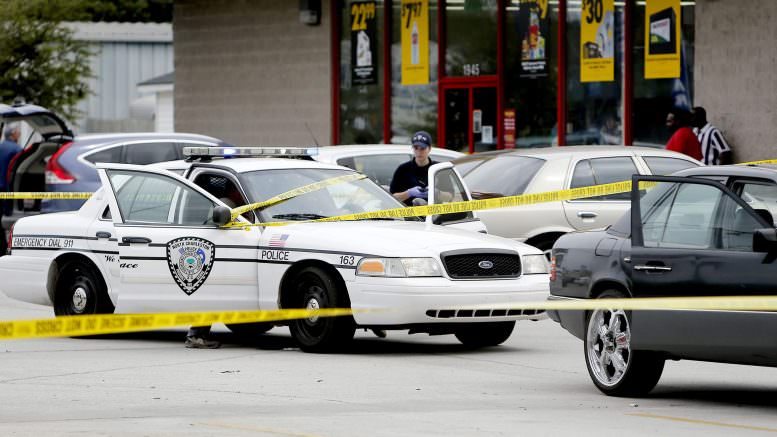Police officers in South Carolina and eight other states could join a class-action lawsuit in hopes of getting back the money they spent to fend off allegations of misconduct.
Slager hearing
A hearing this week in the federal criminal case against Michael Slager has been rescheduled for Friday.
Slager is charged with three federal counts in last year’s shooting death of Walter Scott that was captured on video.
A pretrial conference had been set for Wednesday, but it was pushed back until 9:30 a.m. Friday. U.S. District Judge David Norton will hear any motions or concerns from opposing attorneys in the case at the federal court in downtown Charleston.
A federal trial date has not been set. An Oct. 31 proceeding is planned for the murder case against Slager in state court.
The suit, filed last week in state court in Charleston, came after the Southern States Police Benevolent Association refused to pay an attorney to represent Michael Slager, the former North Charleston officer who shot Walter Scott to death last year. Slager, a group member who had signed up for the association’s legal defense benefit, sued.
But many others in law enforcement also grew unhappy over the association’s decision not to cover Slager in the murder case, said one of his attorneys in the civil suit, Ronnie Richter.
Richter, and partner Eric Bland, then filed the separate class action that seeks to add some of the other 42,000 officers in the association’s coverage area.
Lt. Donald Stanley of the Charleston County Sheriff’s Office is named in the suit as lead plaintiff of the potential class.
At issue is whether the association effectively became an insurer by offering the legal coverage. Both suits allege that the group skirted state insurance regulators by calling their offer a “member benefit” for those who pay $23.50 in monthly dues.
Scott’s death was captured on video, prompting the association to retract Slager’s coverage. It argued that the policy allowed the group to drop clients if it’s determined that the officer willfully violated the law. The shooting came amid heightened scrutiny of uses of police force nationwide.
“In the current climate, it’s foreseeable as a police officer that a claim may be made against you,” Richter said. “It’s important to know the coverage you pay for is available. Ultimately, it has nothing to do with guilt or innocence.”
On top of a refund of dues, the complaint asks for enough punitive damages to stress the seriousness of the association’s alleged actions, and to deter further conduct.
Email and telephone messages left for West Columbia attorneys Edward Bradley and Stephen Moore, who have defended the association in Slager’s lawsuit, were not immediately returned. That suit remains pending in federal court.
Charleston attorney Andy Savage has represented Slager for free in the state murder case that’s set to be tried Oct. 31. He also serves as a government-funded lawyer for the former officer on separate federal charges and as one of the attorneys for the plaintiffs in the class-action suit.
Richter declined to discuss how Stanley became involved in the suit, other than to say the deputy would “adequately represent the interests of the class.” Stanley has been an association member in good standing for 21 years, the suit added. Like other officers, he also has been sued.
The benevolent association offers membership to federal, state and local officers in Georgia, South Carolina, North Carolina, Virginia, West Virginia, Kansas, Arkansas, Tennessee and Louisiana.
The primary perk of the monthly fee, the suit stated, is the “Legal Defense Benefit Plan” that pays attorney fees in case members are targeted in internal probes, civil actions or criminal investigations. Members are given a card with a number to call when they need a lawyer in situations like shootings.
“The plan was the best way possible for each and every member to protect themselves and their families from the potential financial devastation associated with being accused of a crime,” the suit stated.
Despite offering legal defense at no cost, the association’s policy says the group can revoke coverage if “it is determined at any time that the member has committed an intentional, deliberate and/or illegal act, either civilly or criminally.”
The group cited that passage when it declined to back Slager, whose first lawyer, David Aylor of Charleston, dropped him once the video footage emerged three days after the April 4, 2015, shooting. Slager has stood by his innocence, and his attorneys have noted that no court has decided he committed a crime.
Richter said officers should at the least be afforded legal defense when a crime has been alleged. That’s what members thought they were getting, he said.
“All of them paid fees,” he said. “But there are no checks and balances required. … If (the association is) an insurance company, then they need to be subject of regulatory oversight.”
Reach Andrew Knapp at 843-937-5414 or twitter.com/offlede.
Source: www.postandcourier.com




